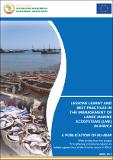Lessons Leant & Best Practices in the Management of Large Marine Ecosystems (LME) in Africa
| dc.contributor.author | AU-IBAR | |
| dc.coverage.spatial | CAMEROON | en |
| dc.date.accessioned | 2022-10-07T13:37:40Z | |
| dc.date.available | 2022-10-07T13:37:40Z | |
| dc.date.issued | 2015-04 | |
| dc.identifier.uri | http://repository.au-ibar.org/handle/123456789/1314 | |
| dc.description.abstract | Large Marine Ecosystems possess wealth of globally significant marine biodiversity and habitats that provide the coastal countries of Africa with some of the world’s most fertile fishing grounds, many of which are transboundary in nature (with either the fish stocks or the fishing fleets migrating regularly across national boundaries, or both). | en |
| dc.format.extent | 22 Pages | en |
| dc.language.iso | en | en |
| dc.publisher | AU-IBAR | en |
| dc.subject | Marine Ecosystems Sustainability | en |
| dc.title | Lessons Leant & Best Practices in the Management of Large Marine Ecosystems (LME) in Africa | en |
| dcterms.subject | FishGov2 Project |
